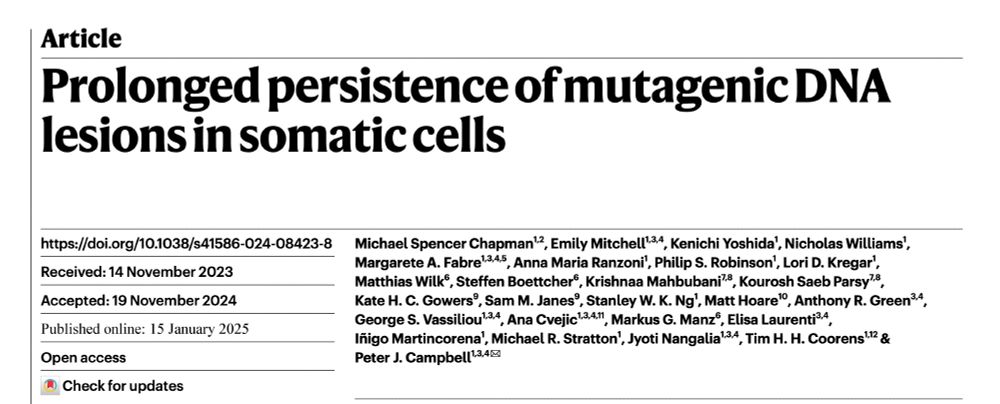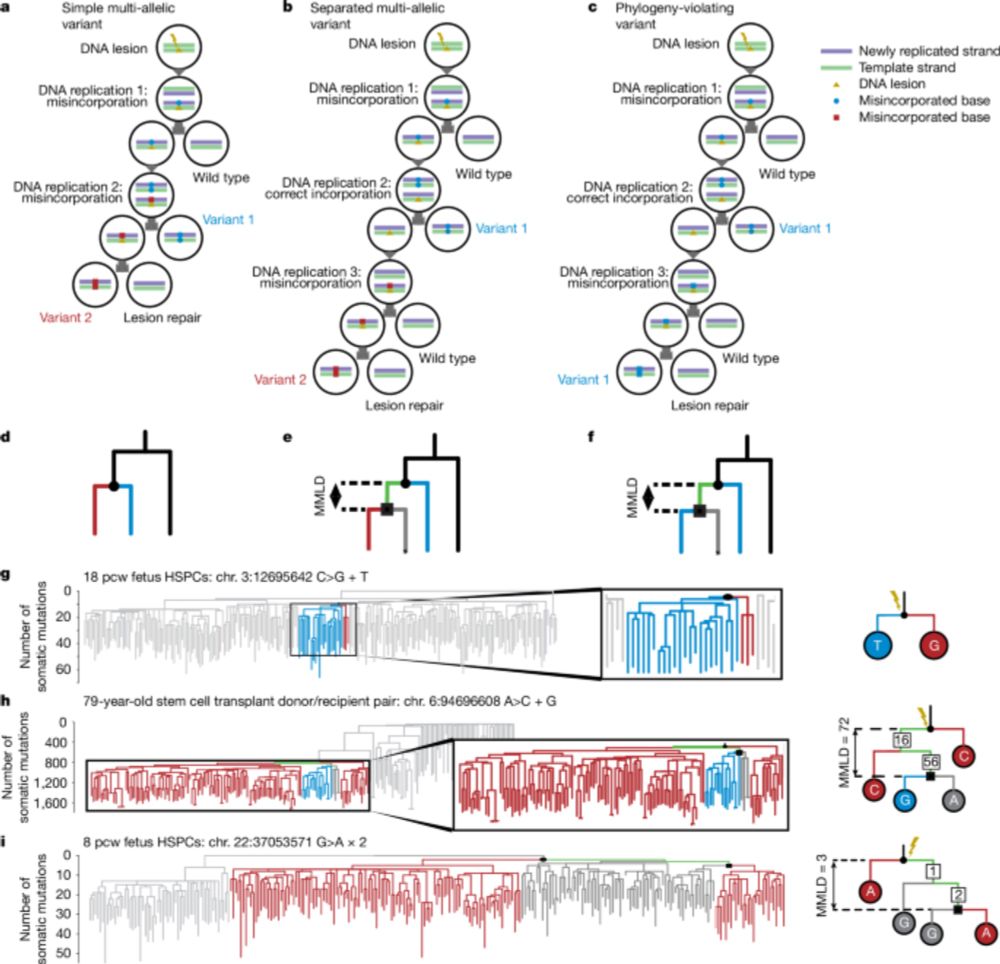Mike Spencer Chapman
@mikespencerchapman.bsky.social
Haematology doctor & researcher, UK. Interested in blood ageing, transplant, cancer and development. Lapsed musician.
Pinned

So pleased to have the paper out, available here: www.nature.com/articles/s41586-024-08423-8
For me this was discovery science as I had always hoped it would be. A lot of fun, and some proper detective work with plenty of twists & turns on the way. Brief thread below
For me this was discovery science as I had always hoped it would be. A lot of fun, and some proper detective work with plenty of twists & turns on the way. Brief thread below
Reposted by Mike Spencer Chapman
The abnormal gene which causes chronic myeloid leukaemia has a very strong ability to drive rapid growth of the cancer, research has revealed 🧬
Scientists were able to track the evolution of this gene to study the rate at which the cancer cells expand: bit.ly/42riKOk
Scientists were able to track the evolution of this gene to study the rate at which the cancer cells expand: bit.ly/42riKOk

April 10, 2025 at 10:58 AM
The abnormal gene which causes chronic myeloid leukaemia has a very strong ability to drive rapid growth of the cancer, research has revealed 🧬
Scientists were able to track the evolution of this gene to study the rate at which the cancer cells expand: bit.ly/42riKOk
Scientists were able to track the evolution of this gene to study the rate at which the cancer cells expand: bit.ly/42riKOk
Lovely piece from @s-j-aitken.bsky.social and Claudia Arnedo Pec discussing our recent paper in @nature.com on persistent mutagenic DNA lesions... Love the title!
Puts it in the context of their beautiful previous work on lesion segregation
Puts it in the context of their beautiful previous work on lesion segregation
🧩DNA Lesions Piece Together Impossible Trees🧩
This was a fun piece to write (and illustrate!) with Dr Claudia Arnedo Pac about @mikespencerchapman.bsky.social and co’s recent @nature.com paper. Thank you for the invitation, Maria @cp-trendsgenetics.bsky.social
authors.elsevier.com/sd/article/S...
This was a fun piece to write (and illustrate!) with Dr Claudia Arnedo Pac about @mikespencerchapman.bsky.social and co’s recent @nature.com paper. Thank you for the invitation, Maria @cp-trendsgenetics.bsky.social
authors.elsevier.com/sd/article/S...

April 2, 2025 at 9:28 PM
Lovely piece from @s-j-aitken.bsky.social and Claudia Arnedo Pec discussing our recent paper in @nature.com on persistent mutagenic DNA lesions... Love the title!
Puts it in the context of their beautiful previous work on lesion segregation
Puts it in the context of their beautiful previous work on lesion segregation
Reposted by Mike Spencer Chapman
Interested in 'Mitochondrial single cell-multi-omics for lineage tracing and genetics'? Apply for our free workshop in Berlin following our #ISCO2025 conference!
www.isco-conference.eu
www.mdc-berlin.de/news/events/...
www.isco-conference.eu
www.mdc-berlin.de/news/events/...

Mitochondrial single cell-multi-omics for lineage tracing and genetics
www.mdc-berlin.de
January 31, 2025 at 10:36 AM
Interested in 'Mitochondrial single cell-multi-omics for lineage tracing and genetics'? Apply for our free workshop in Berlin following our #ISCO2025 conference!
www.isco-conference.eu
www.mdc-berlin.de/news/events/...
www.isco-conference.eu
www.mdc-berlin.de/news/events/...
Reposted by Mike Spencer Chapman
Is hypothesis generation a hindrance to Night Science? @itaiyanai.bsky.social and @stearnslab.bsky.social demonstrated how easy we fall into pattern recognition, missing the “Gorilla” in our own data. Today’s seminar was all about identifying new strategies to stay curious about our own data.

January 31, 2025 at 12:59 AM
Is hypothesis generation a hindrance to Night Science? @itaiyanai.bsky.social and @stearnslab.bsky.social demonstrated how easy we fall into pattern recognition, missing the “Gorilla” in our own data. Today’s seminar was all about identifying new strategies to stay curious about our own data.
Reposted by Mike Spencer Chapman
🌟NEW PREPRINT ALERT!🌟
We are very pleased to introduce #StrainDifferences: “Genetic background sets the trajectory of cancer evolution”
www.biorxiv.org/content/10.1...
🧵[1/12]
We are very pleased to introduce #StrainDifferences: “Genetic background sets the trajectory of cancer evolution”
www.biorxiv.org/content/10.1...
🧵[1/12]

Genetic background sets the trajectory of cancer evolution
Human cancers are heterogeneous. Their genomes evolve from genetically diverse germlines in complex and dynamic environments, including exposure to potential carcinogens. This heterogeneity of humans,...
www.biorxiv.org
January 15, 2025 at 7:19 PM
🌟NEW PREPRINT ALERT!🌟
We are very pleased to introduce #StrainDifferences: “Genetic background sets the trajectory of cancer evolution”
www.biorxiv.org/content/10.1...
🧵[1/12]
We are very pleased to introduce #StrainDifferences: “Genetic background sets the trajectory of cancer evolution”
www.biorxiv.org/content/10.1...
🧵[1/12]
Thanks for sharing! And apologies for the cheap kitten meme..
Check out @mikespencerchapman.bsky.social's thread below to find out more about his latest @nature.com paper on DNA damage ⤵️
In science, we often see weird blips in the data. The question: is it artefact (usually!), or something new & exciting? We don’t always have time to dig deep.
Our paper in @nature.com today came from just such a blip. So don’t ignore the weird stuff. Pull on that thread...
Our paper in @nature.com today came from just such a blip. So don’t ignore the weird stuff. Pull on that thread...
January 16, 2025 at 10:41 AM
Thanks for sharing! And apologies for the cheap kitten meme..
Reposted by Mike Spencer Chapman
📰 Some forms of DNA damage linger unrepaired in healthy cells for years, according to a @nature.com study led by Dr Mike Spencer Chapman @mikespencerchapman.bsky.social at BCI and @sangerinstitute.bsky.social.
The findings could inform our understanding of #cancer development. 🧪 #medsky
The findings could inform our understanding of #cancer development. 🧪 #medsky

Discovery of lingering DNA damage could change our understanding of cancer development - Barts Cancer Institute - Queen Mary University of London
Dr Michael Spencer Chapman and team have uncovered forms of DNA damage in healthy cells that can persist unrepaired for years.
bit.ly
January 15, 2025 at 4:42 PM
📰 Some forms of DNA damage linger unrepaired in healthy cells for years, according to a @nature.com study led by Dr Mike Spencer Chapman @mikespencerchapman.bsky.social at BCI and @sangerinstitute.bsky.social.
The findings could inform our understanding of #cancer development. 🧪 #medsky
The findings could inform our understanding of #cancer development. 🧪 #medsky
Reposted by Mike Spencer Chapman
This is a cool paper about the surprisingly long-term persistence of DNA lesions (single stranded DNA errors) in the human body. Exquisitely meticulous work from conception through to execution. Congratulations @mikespencerchapman.bsky.social
So pleased to have the paper out, available here: www.nature.com/articles/s41586-024-08423-8
For me this was discovery science as I had always hoped it would be. A lot of fun, and some proper detective work with plenty of twists & turns on the way. Brief thread below
For me this was discovery science as I had always hoped it would be. A lot of fun, and some proper detective work with plenty of twists & turns on the way. Brief thread below

January 15, 2025 at 10:41 PM
This is a cool paper about the surprisingly long-term persistence of DNA lesions (single stranded DNA errors) in the human body. Exquisitely meticulous work from conception through to execution. Congratulations @mikespencerchapman.bsky.social
Yes! @s-j-aitken.bsky.social your fantastic work on lesion segregation really was the foundation for this.. gave us early confidence that some lesions were able to persist through multiple cell divisions & that our theory was viable
Building on our discovery of #LesionSegregation, @mikespencerchapman.bsky.social and colleagues from @sangerinstitute.bsky.social find that some DNA lesions can persist in humans for months or years!
"Prolonged persistence of mutagenic DNA lesions in somatic cells"
www.nature.com/articles/s41...
"Prolonged persistence of mutagenic DNA lesions in somatic cells"
www.nature.com/articles/s41...

Prolonged persistence of mutagenic DNA lesions in somatic cells - Nature
Persistent DNA lesions can occur throughout the human lifespan and can remain in the genome of affected cells for several years and generate a substantial proportion of the mutational burden.
www.nature.com
January 15, 2025 at 10:45 PM
Yes! @s-j-aitken.bsky.social your fantastic work on lesion segregation really was the foundation for this.. gave us early confidence that some lesions were able to persist through multiple cell divisions & that our theory was viable
In science, we often see weird blips in the data. The question: is it artefact (usually!), or something new & exciting? We don’t always have time to dig deep.
Our paper in @nature.com today came from just such a blip. So don’t ignore the weird stuff. Pull on that thread...
Our paper in @nature.com today came from just such a blip. So don’t ignore the weird stuff. Pull on that thread...

January 15, 2025 at 9:44 PM
In science, we often see weird blips in the data. The question: is it artefact (usually!), or something new & exciting? We don’t always have time to dig deep.
Our paper in @nature.com today came from just such a blip. So don’t ignore the weird stuff. Pull on that thread...
Our paper in @nature.com today came from just such a blip. So don’t ignore the weird stuff. Pull on that thread...
I've made the switch! Looking forward to a more inspiring newsfeed.. 🤞
January 14, 2025 at 10:59 AM
I've made the switch! Looking forward to a more inspiring newsfeed.. 🤞

